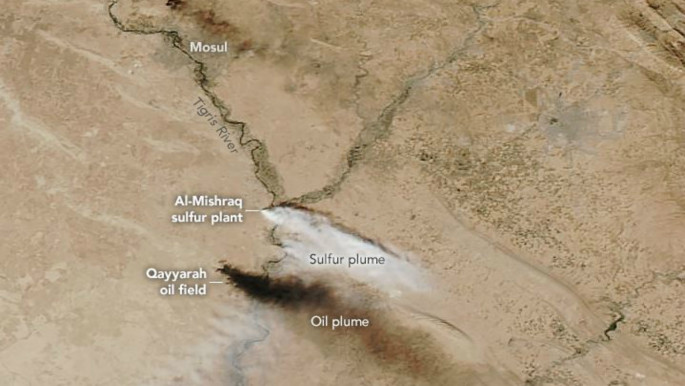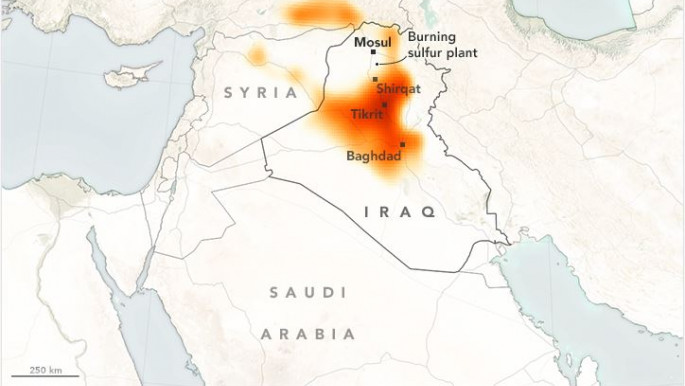Toxic clouds over Iraq 'worsening Mosul humanitarian crisis'
Toxic clouds over northern Iraq from a burning sulphur plant and oil wells set ablaze by Islamic State group militants have contributed to the "wholesale destruction of Iraq's environment".
Two Iraqis died after militants blew up the Mishraq sulphur mine in Mosul, and more than a 1,000 were hospitalised.
"It makes living conditions dangerous and miserable, if not impossible. It will push countless people to join the unprecedented global refugee population," UN environment chief Erik Solheim said.
"That's why the environment needs to be placed at the centre of crisis response, conflict prevention and conflict resolution."
Stockpiles of sulphur dioxide stored at the Mishraq Sulphate Factory caught fire last Friday, leading to a large toxic cloud spreading over dozens of kilometres.
Two Iraqis died from the attack, and more than a thousand were treated for suffocation in Qayyarah, Ijhala, and Makhmour health centres.
| Plumes of smoke near Mosul, captured on October 22 [NASA] |
IS militants have also set fire to 19 oil wells, the UN said, as part of its "scorched earth" tactics, with civilians and armed forces exposed to toxic fumes, causing health problems such as skin irritation and shortness of breath.
Earlier this month a water plant was caught in the crossfire, leading to a chlorine gas leak and around 100 civilians needing medical treatment.
Satellite images from NASA show the extent of the plumes. It said if the sulphur dioxide were coming from a volcano rather than a fire, it would already be among the largest eruptions of 2016.
| Levels of sulphur dioxide over Iraq, captured October 24 [NASA] |
"In the first few days, the fire did not appear to be particularly energetic and our preliminary observations suggest that much of the sulphur dioxide remained in the boundary layer and the lower troposphere, which accentuates the impact on air quality and health," said Simon Carn, an atmospheric scientist at Michigan Tech.
In high concentrations, sulphur dioxide can be life-threatening, he added.
"This ongoing ecocide is a recipe for a prolonged disaster," Solheim said.
"This is sadly just the latest episode in what has been the wholesale destruction of Iraq's environment over several decades - from the draining of the marshlands to the contamination of land and the collapse of environmental management systems."


![Minnesota Tim Walz is working to court Muslim voters. [Getty]](/sites/default/files/styles/image_684x385/public/2169747529.jpeg?h=a5f2f23a&itok=b63Wif2V)




![Israeli officials are considering exiling Yahya Sinwar to Sudan as part of a deal to end the war [Getty]](/sites/default/files/styles/image_330x185/public/1251837582.jpeg?h=127ba027&itok=ujxSRy_f)
![Debris near Rafic Hariri International Airport [Getty]](/sites/default/files/styles/image_330x185/public/2176162423.jpeg?h=a5f2f23a&itok=MCSK9mkM)
![An Israeli air strike on Jabalia killed teenage journalist Hassan Hamad [Screengrab/X]](/sites/default/files/styles/image_330x185/public/2024-10/hassan%20hamad1.jpg?h=c12e0b96&itok=Rd_dyCVp)